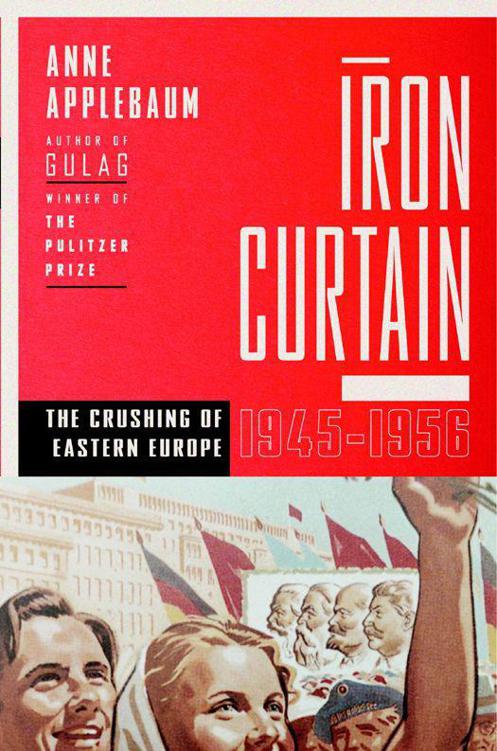
Iron Curtain
The Crushing of Eastern Europe, 1944-1956
کتاب های مرتبط
- اطلاعات
- نقد و بررسی
- دیدگاه کاربران
نقد و بررسی

Starred review from September 17, 2012
According to this disturbing but fascinating history, the U.S.S.R.’s 1944–1950 subjugation of Eastern Europe was a brutal process. With other priorities in the forefront at Yalta and other wartime Allied summits, FDR gave Soviet occupation of Eastern Europe short shrift, according to Pulitzer Prize–winning author Applebaum (Gulag). In this account of the Soviet takeover of Eastern Europe during and after WWII, Applebaum concentrates on events in Poland, Hungary, and what became East Germany, all of which unroll with depressing sameness. The Soviet army arrived in 1944–1945 with enormous destruction. There followed an orgy of arrests, trials, executions, and deportation of “fascists,” a broad category that included noncommunist anti-Nazi resistance groups. Expulsions of ethnic Germans was also carried out on a mass scale. Faithful Marxists, the Soviet leaders knew that the masses would prefer communism, so they initially allowed political parties, churches, newspapers, and even elections, assuming the people would naturally vote for a proletarian state. When that didn’t happen, democracy was quickly shut down. Applebaum delivers a gripping if unremittingly painful account of the period during which Communists, astonished at losing every election, steadily suppressed civil society, whereupon darkness descended for 40 years. With precision in her narration and penetrating analysis, Applebaum has written another masterful account of the brutality of Soviet rule. Illus., maps. Agent: Georges Borchardt, Georges Borchardt Inc.

Starred review from October 1, 2012
A Pulitzer Prize-winning author returns with the story of those dark decades in Eastern Europe when the Soviet Union slammed the prison doors on people, cultures and countries. Realizing she could not tell the whole story in one volume, Washington Post and Slate columnist Applebaum (Gulag: A History, 2003, etc.) focuses on Poland, East Germany and Hungary and shows how their stories were representative. She begins as World War II was ending. The Russians were plowing through Eastern Europe on their way to Berlin. While many of the Allies were thinking of home, the Soviets had grander and grimmer ideas. Applebaum shows how the communists gained political control of individual countries (they were sometimes surprised in "elections" how unpopular they were), then charts how--in the service of their iron ideology--they systematically destroyed economies, organizations, the arts, education, the press, the judiciary, the church, the entertainment industries and every other social institution. Internment camps and prisons became the true growth industries. Applebaum also explores the tactics employed to keep people in line: fear and intimidation, of course, but also a massive propaganda industry that sought to convince everyone that things were better than they were, but not nearly as good as they would be in five years or so. They invested much hope in education, believing they could indoctrinate an entire generation. It didn't work. Periodically, the author chronicles what was happening in the West (the Marshall Plan, the Berlin Airlift). Beginning with the death of Stalin, Applebaum shows how and why things slowly began to change. The emerging youth culture, the resurgence of religious belief, the rise of a new generation of writers and artists--these were among the factors that energized the 1956 uprisings, which, of course, the Soviets temporarily crushed. A dark but hopeful chronicle that shows how even humanity's worst can fracture and fall.
COPYRIGHT(2012) Kirkus Reviews, ALL RIGHTS RESERVED.

May 1, 2012
Slate and Washington Post columnist Applebaum won a Pulitzer for Gulag, so you can bet that a lot of folks will be anticipating her next book. Here she explains how the Soviet Union, suddenly in control of the countries of Eastern Europe after World War II, turned them into communist regimes. Applebaum not only dug into newly opened archives but conducted interviews, which should give this book a personal feel. Exciting!
Copyright 2012 Library Journal, LLC Used with permission.

October 15, 2012
Applebaum's Gulag received a 2004 Pulitzer Prize, an accolade that accords prominence on her new, groundbreaking investigation of the history of communism. Examining Stalin's imposition of totalitarian regimes on Poland, Hungary, and the Soviet zone of Germany, Applebaum depicts Communist parties that were remorselessly successful in destroying opposition but that failed to win widespread popular support. An interesting motif in Applebaum's history is the awareness by Communist leaders of civil society's rejection of Stalinist socialism, demonstrated by the communists' losses in somewhat unfettered postwar elections. After redressing that problem with rigged polls and mini gulags, the regimes strove to improve communist ideology's attractiveness through propaganda, mass demonstrations, socialist realism in art, and model communist cities. Some people became convinced supporters, but most did not and survived through personal compromises with communism. The latter's individual stories, drawn from interviews and research into those suppressed by state security, infuse Applebaum's account with perplexing human interest. What made for a collaborator, a true believer, a dissident? A masterful chronicle and analysis, Applebaum's work is a history-shelf necessity.(Reprinted with permission of Booklist, copyright 2012, American Library Association.)

























دیدگاه کاربران